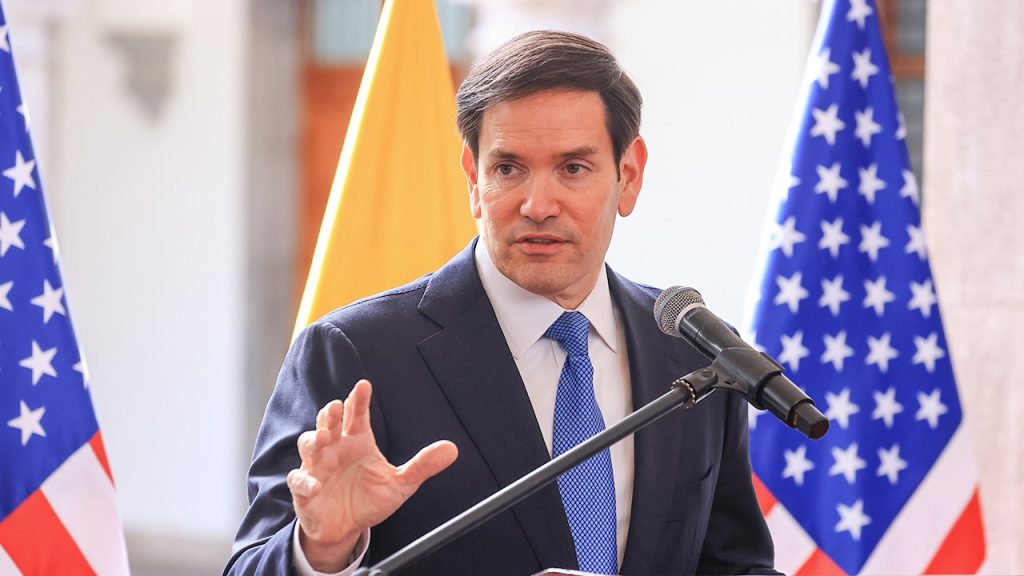Trump Administration Declares War on Narco-Terrorism in Ecuador
In a bold declaration that signals a new era in the fight against drug trafficking, Secretary of State Marco Rubio announced during a joint news conference in Ecuador that the Trump administration is preparing to “wage war” against narco-terrorists. Speaking alongside Ecuador’s foreign minister, Rubio emphasized the severity of the threat, stating, “It’s a war on killers. It’s a war on terror. These are not narco-traffickers, these are narco-terrorists who terrorize the countries they operate in.” This rhetoric marks a significant shift in how the United States characterizes and approaches drug cartels, elevating them from criminal organizations to entities that pose national security threats on par with traditional terrorist groups. The administration’s decision to frame this as a war on terror rather than simply law enforcement reflects the increasingly violent and destabilizing influence these organizations have across the Americas.
As part of this renewed commitment, Rubio announced the designation of two Ecuadorian criminal groups, Los Choneros and Los Lobos, as foreign terrorist organizations. This classification is far more than symbolic—it enables enhanced intelligence sharing between the United States and Ecuador that could lead to “potentially lethal operations” against these groups. To support Ecuador’s efforts, the Trump administration has pledged $13.7 million to combat drugs and crime, along with $6 million worth of unmanned aircraft vehicle systems for the Ecuadorian Navy. This material support demonstrates that the U.S. is backing its strong rhetoric with tangible resources. However, Rubio was careful to note that the relationship between the two countries would not be limited to security matters, emphasizing America’s desire to expand its “vibrant economic relationship” with Ecuador—suggesting a multifaceted approach that combines security cooperation with economic development.
The administration’s aggressive stance extends beyond Ecuador to Venezuela, where U.S. Marines recently conducted an unprecedented strike on a cartel-operated vessel, killing 11 members of Tren de Aragua, a group the Trump administration designated as a terrorist organization in February. When confronted with United Nations assessments suggesting Venezuela isn’t significantly involved in drug trafficking, Rubio dismissed these claims outright: “I don’t care what the U.N. says. The U.N. doesn’t know what they’re talking about.” He pointed to the indictment of Venezuelan leader Nicolás Maduro by a grand jury in the Southern District of New York as evidence of Venezuela’s involvement in drug trafficking. “Let there be no doubt,” Rubio declared, “Nicolás Maduro is an indicted drug trafficker in the United States, and he’s a fugitive of American justice.” This direct challenge to both the U.N.’s assessment and Venezuela’s leadership demonstrates the administration’s willingness to pursue its anti-drug agenda regardless of international opinion or diplomatic sensitivities.
The maritime strike near Venezuela represents a dramatic escalation in U.S. counter-narcotics operations. This type of direct military action against drug traffickers outside U.S. territory signals that the Trump administration is embracing a more interventionist approach to disrupting drug supply chains before they reach American shores. Following the operation, President Trump himself issued a stark warning on Truth Social: “Please let this serve as notice to anybody even thinking about bringing drugs into the United States of America. BEWARE!” This messaging suggests the administration views such military strikes not only as tactical operations but also as strategic deterrents meant to intimidate other cartels and trafficking organizations. Rubio reinforced this message by discussing “cooperative governments” that would assist the United States in identifying and locating drug traffickers, bluntly stating they would “help us find these people and blow them up, if that’s what it takes.”
This hardline approach reflects a fundamental shift in how the United States conceptualizes the fight against drug trafficking. By designating these groups as terrorist organizations rather than criminal enterprises, the administration gains access to additional legal authorities, intelligence capabilities, and military options that would otherwise be unavailable or more difficult to deploy. It also allows for a different framing of the issue in public discourse—positioning the fight against drugs as a matter of national security rather than merely law enforcement or public health. This framing may resonate with voters concerned about border security and the devastating effects of drug addiction in American communities, particularly as the country continues to grapple with an opioid epidemic that has claimed hundreds of thousands of lives.
However, the long-term effectiveness of this approach remains to be seen. Previous “wars” on drugs have often struggled to achieve lasting results, despite significant investments of resources and political capital. Critics might question whether military strikes and terrorist designations will meaningfully reduce drug supply or demand, or whether they might instead lead to unintended consequences such as increased violence, political instability in partner nations, or the fragmentation of cartels into smaller, potentially more violent groups. Nevertheless, the Trump administration’s decisive actions and unambiguous messaging make clear that it views disrupting the international drug trade as a top priority and is willing to use the full spectrum of American power—diplomatic, economic, and military—to pursue this objective. As this policy unfolds, its impact will be felt not only in countries like Ecuador and Venezuela but also in communities across the United States affected by drug trafficking and addiction.


